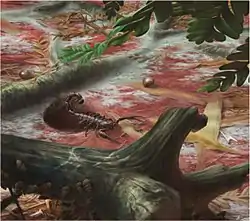Opsieobuthus
Opsieobuthus is an extinct genus of centromachid scorpion from the Chemnitz petrified forest in Germany. It was alive during the Permian period in Germany (~291–280 ma). Two species are currently known: O. pottsvillensis[1] and O. tungeri.[2]

An artist's illustration of O. tungeri at the mouth of its burrow
| Opsieobuthus | |
|---|---|
 | |
| Holotypes (A-B) and paratypes (C-D) of O. tungeri | |
| Scientific classification | |
| Kingdom: | Animalia |
| Phylum: | Arthropoda |
| Subphylum: | Chelicerata |
| Class: | Arachnida |
| Order: | Scorpiones |
| Family: | †Centromachidae |
| Genus: | †Opsieobuthus Kjellesvig-Waering, 1986 |
| Type species | |
| †Opsieobuthus pottsvillensis Kjellesvig-Waering, 1986[1] | |
| Species | |
| |
References
- Kjellesvig-Waering, E. N. (1986). "A restudy of the fossil Scorpionida of the world". Palaeontographica Americana. 55: 1–287.
- Dunlop, Jason A.; Legg, David A.; Selden, Paul A.; Fet, Victor; Schneider, Joerg W.; Rößler, Ronny (2016). "Permian scorpions from the Petrified Forest of Chemnitz, Germany". BMC Evolutionary Biology. 16 (1): 72. doi:10.1186/s12862-016-0634-z. PMC 4823912. PMID 27056633.
External links
 Media related to Opsieobuthus at Wikimedia Commons
Media related to Opsieobuthus at Wikimedia Commons
This article is issued from Wikipedia. The text is licensed under Creative Commons - Attribution - Sharealike. Additional terms may apply for the media files.